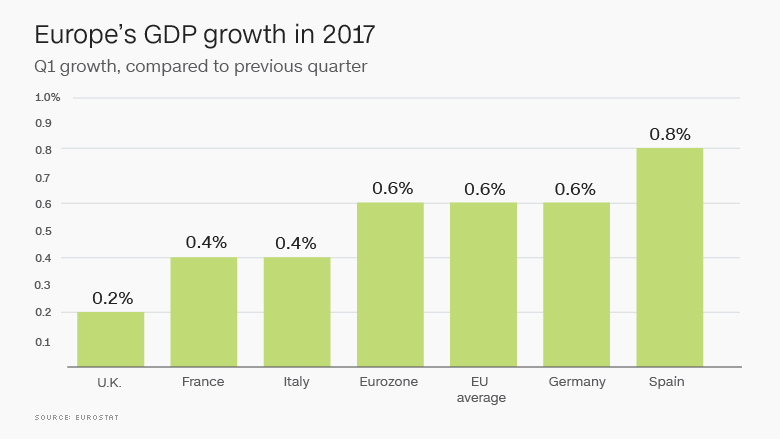
Britain has slumped to the bottom of Europe's economic growth league.
At 0.2%, its GDP growth rate in the first quarter (compared with the previous quarter) was the lowest seen across all 28 members of the European Union, according to data released by Eurostat on Thursday.
The U.K. performed weaker even than Greece, a country that was at risk of slipping into recession at the end of 2016.
The disappointing data came as a surprise to economists. Based on preliminary estimates, the U.K. was thought to have matched Italy's performance and come in ahead of Greece in the first three months of 2017.
Most countries saw their numbers revised higher since the first estimates were released.
The U.K., however, suffered a downgrade of 0.1%, and its first quarter performance represents a sharp slowdown from expansion of 0.7% in the final quarter of 2016.
"The resilience of the U.K. economy to Brexit suffered a major blow in the first quarter," said Raj Badiani, economist at IHS Markit.
"[The slump] was partly triggered by the start of a more subdued phase of consumer spending, with increased household stress pushing back the recent gains of several years of high employment and improved purchasing power over much of 2016," he added.

Related: Britain goes to the polls
The U.K. Office of National Statistics said that slower growth resulted from weaker retail sales, and reduced consumer spending on hotel stays and transportation.
Consumers have been hit by rising prices, a side effect of the sharp decline in the value of the pound since Brits voted last June to leave the EU.
The pound was trading at $1.29 against the dollar on Thursday, almost 14% below the levels seen on the day of the Brexit referendum.
"The [growth] dip is probably temporary," said Kallum Pickering, senior economist at Berenberg Bank, predicting growth could rebound to 0.4% in the three month period to the end of June.
That would still leave the U.K. trailing the EU average and on par with countries that were hit hard by the eurozone crisis, such as Italy and Greece.
The data comes on the day of Britain's general election. The timing is a coincidence -- Eurostat data releases are scheduled months in advance.


